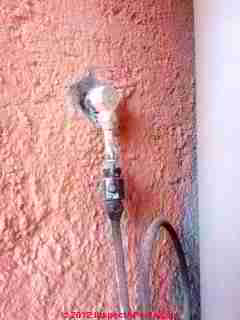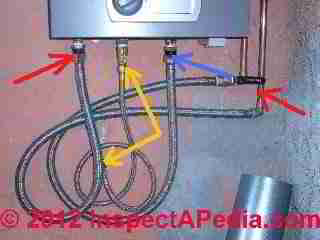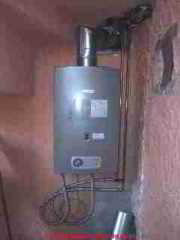 Tankless Water Heater Installation Procedure & Troubleshooting
Tankless Water Heater Installation Procedure & Troubleshooting
Case study details installing a tankless water heater to replace a conventional hot water tank & heater
- POST a QUESTION or COMMENT about how to install a demand or instant or tankless hot water heating system: installation details, problems, solutions
How & why to install a tankless or demand water heater.
This article describes the conversion from a conventional LP-gas fired hot water tank & heater to a Bosch Confort 13BP N low-pressure system tankless water heater. With text & photos we illustrate both the old and new water heating systems and the steps required to install the tankless water heater.
The article reports on why the owners decided to convert to a tankless water heating system, and on both their satisfaction and their disappointments in the results.
InspectAPedia tolerates no conflicts of interest. We have no relationship with advertisers, products, or services discussed at this website.
- Daniel Friedman, Publisher/Editor/Author - See WHO ARE WE?
Tankless water heater installation details: conversion from a conventional hot water tank to a demand-type Bosch instant water heater
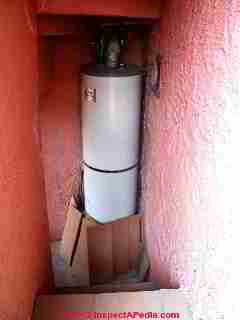 Article contents
Article contents
- TANKLESS WATER HEATER INSTALLATION - CONTENTS: installation details: conversion from a conventional hot water tank to a demand-type Bosch instant water heater
- WHY OWNERS DECIDED To install an instant water heater
- REMOVING the OLD hot water heater
- PREPARING to INSTALL the tankless water heater
- MINIMUM HOT WATER FLOW RATE Required for Tankless Water Heaters
- HIGH ELEVATION Requires Special Modification for some Tankless Water Heaters
- TANKLESS WATER HEATER PRESSURE/ Temperature Relief Valve Requirements
- COMBUSTION AIR REQUIREMENTSfor Gas-Fired Tankless Water Heaters
- HOOKING UP water, fuel, electrical details for a tankless water heater
- TANKLESS WATER HEATER PERFORMANCE compared to the conventional hot water tank & heater that was removed
- Tankless Water Heater HOT WATER SUPPLY SUDDEN ON-OFF & Intermittent hot water losses
- HOW TO AVOID SUDDEN COLD WATER BURSTSor Complete Loss of Hot Water from a Tankless or Instant Water Heater System
- LP to NATURAL GAS CONVERSION for Tankless, Demand, Instantaneous, or Point of Use Water Heaters?
Why owners decided to install an instant water heater
The LP gas fired 30-gallon water heater shown at above left was installed around 2001 and was still in working condition. But the building occupants were not happy with their hot water supply for several reasons:
- The water heater needed a new control - it did not respond to a water temperature drop until the water heater was nearly cold - meaning that getting a hot shower out of this unit was hit-or miss. We could have just replaced the bad control and de-scaled the water heater but there were other complaints that added up to a decision to try an alternative and more efficient way to make hot water just when needed.
See WATER HEATER SCALE DE-LIMING PROCEDURE - The home is usually occupied by just two people and hot water use is quite modest. But when visitors are staying in the home the 30-gallon water heater tank was usually insufficient for all of the hot water uses and users.
- Wind occasionally blows at the heater bottom of this outdoor but sheltered location, putting out the pilot light and leading to complete loss of hot water. That explains those ceramic tiles stacked around the heater base - a wind screen.
- The water heater had never properly fit in its installation location -it was too tall. If you check the detailed photo below
at WATER HEATER FLUE VENT DIAMETER you'll see (red arrow) that the original installer just took off the water heater's draft hood and set it aside. The appliance had never been properly vented nor was it in compliance with the manufacturer's specifications. - The water heater did not contain a safe pressure/temperature relief valve. In our detailed photo below the blue arrow points to a pressure-only type relief device; no other safety valve was found on the heater.
How to prepare to install a new tankless water heater
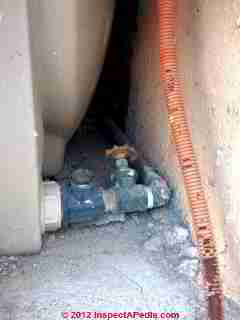
Before starting to work on a water heater or water heater swap-out such as this change from a gas fired conventional water heater and tank to a tankless Bosch instant water heater, don't forget these preparatory steps:
- Determine the hot water requirements & choose a water heater size & type (in this case a tankless or instant water heater) -
see TANKLESS WATER HEATER SIZE REQUIREMENTS .
For this installation we had also to choose between a standard "high pressure" tankless water system and a "low pressure" model intended for installation where building supply water pressure is low
- for example when water is provided by a rooftop water storage tank rather than by municipal water pressure. - Find & read the manufacturer's installation instructions; read the instructions through, and compare the installation details to conditions at your building.
You can save some trouble and avoid a botched job by noticing in advance that more work may be needed than first meets the eye. Examples may involve fuel piping, chimneys and vents, even installation working space. - Find the cold water shutoff valve, including the main cold water shutoff valve if you are going to have to cut and reroute the existing cold water line and valve already near the old water heater.
Our photo (above-left) shows the main water shutoff for a rooftop water storage tank. Knowing where this is ahead of time can avoid a flood. - Find the gas supply main shutoff as well as the local gas shutoff valve near the heating appliance.
How to remove the old hot water heater in preparation for its replacement
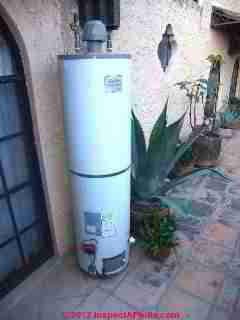 The steps to remove the old water heater are pretty simple:
The steps to remove the old water heater are pretty simple:
- Let the water heater cool down to avoid getting scalded - turn off the water heater's fuel supply;
- Turn off cold water inlet to the water heater;
- Connect a garden hose to the water heater drain valve and route the end of the hose to a suitable drainage location, keeping in mind that white muck, salts or mineral debris may be flowing out along with the water in the tank.
- Open one or more nearby hot water faucets to ease draining of the water tank.
See WATER HEATER AIR INLET - Open the water heater drain valve and drain the tank. Details of this procedure are
at WATER HEATER DRAIN PROCEDURE. - Disconnect the gas line at the water heater
- Disconnect or if necessary cut the cold in and hot out water lines at the water heater
- With help, carry the water heater out of the work area for later disposal.
This water heater is going to be used as an intermediate storage tank for someone's home-made solar hot water system.
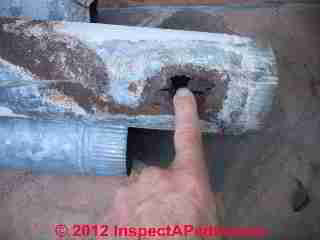
- Inspect the old water heater and other removed parts for clues that may explain its condition and may give warnings about the new heater installation. As you'll see in photographs below we found a few interesting conditions including
- Evidence of a prior LP gas leak - black deposits around the old LP gas shutoff valve (tests showed that a previous repair had corrected the leak)
- Rust and corrosion around the heater base, possibly related to that enclosure by clay tiles as a wind-block
- Severely-corroded, perforated metal chimney sections.
The original chimney, enclosed in a concrete wall, had corroded through; since the whole installation was outdoors the risk of flue gases bothering building occupants seemed pretty low, but there remained a concern that following corrosion, concrete or other debris could fall into and block the flue - an unsafe condition.
New Water Heater Hookup Prep: check water heater flue vent diameter, routing, length, clearances for combustion gas venting
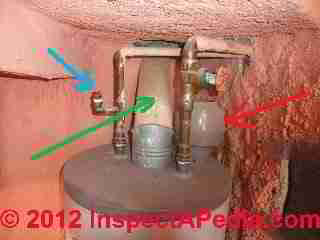
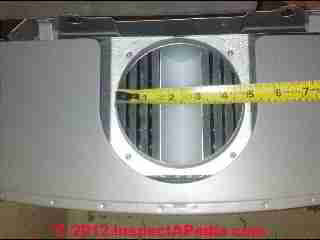
The original LP gas water heater (above left) vented through a 4-inch metal flue (green arrow in our photo). We measured the diameter of the flue vent connector on the new Bosch instant water heater (above right), confirming that it wanted a 5-inch flue vent or chimney.

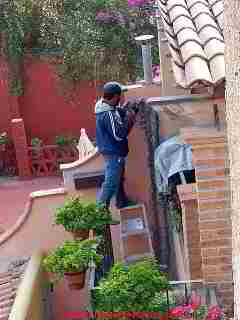
Watch out: some installers opined that the new 5-inch vented tankless heater would work just fine connected to a 4-inch chimney.
We did not agree, nor does the manufacturer who is very clear on this point.
Venting a heating appliance into a flue or chimney smaller than the outlet diameter of the vent connection on the appliance itself is asking for trouble including:
- loss of flame as the burner cannot vent and, surrounded by flue gases, goes out due to lack of oxygen
- dangerous production of carbon monoxide
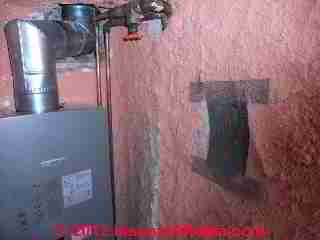 Our photograph at left as well as the above right photo show what was required to install the new 5-inch chimney and vent system for this heater. We had to chop open a concrete wall, remove the 4-inch chimney and install a 5-inch diameter chimney in the same location.
Our photograph at left as well as the above right photo show what was required to install the new 5-inch chimney and vent system for this heater. We had to chop open a concrete wall, remove the 4-inch chimney and install a 5-inch diameter chimney in the same location.
At left you can see the 5-inch flue vent connector and elbows entering the base of the chimney for this appliance.
Water heater Installation tip: because we were working in close quarters we decided to get the entire chimney, elbows and flue vent connector in place before setting the exact mounting position of the heater itself.
That was a lot easier than mounting the heater and then wrestling with custom-cut little vent connection pieces to try to match an arbitrary heater mount location to the exact location of the bottom of the metal chimney.
That screened vent shown in the right side of the photo was an add-on exit vent for an indoor gas-log fireplace; we didn't want any interference between those two gas burning appliances and we didn't want any possibility of drawing carbon monoxide gas into the building through the screened vent when the fireplace was not in use.
Check water heater LP or natural gas supply: piping diameter, flow rates, regulators, controls
At below left you'll notice that we chipped away some concrete where the LP gas pipe penetrates the masonry wall. We confirmed that the LP gas line to this point was 1/2-inch in diameter, meeting the manufacturer's confusing specifications on this point.
We say confusing because while the instant water heater installation instructions recommend feeding a 1/2-inch LP gas line to the tankless heater, the actual gas pipe fittings, valve, and flexible gas line provided by the manufacturer in an installation kit named as intended for this Bosch heater were all 3/8-inch diameter.
We decided to connect a new gas shutoff valve to the existing 1/2-inch gas line at the wall and use the kit's 3/8-inch flexible gas line & fittings for the remainder of the connection.
Hooking up water, fuel, electrical details for a tankless water heater

Before starting to work on a water heater don't forget to locate ahead of time
As we warned in our introduction:
- Be sure you have located the main cold water shutoff valve, you might suddenly find you need to close the main cold water shutoff valve if you are going to have to cut and reroute the existing cold water line and valve already near the old water heater.
- Be sure you have found the main gas supply main shutoff as well as the local gas shutoff valve near the heating appliance. We want to know the location of the main gas valve ahead of time to be certain that in an emergency we can quickly and safely shut off gas supply to the building.
At the photo at below right you can see the new water and gas piping connections at the bottom of this instant water heater.
Yellow arrows point to the LP gas line connections.
Red arrows point to hot water piping connections. Notice that for safety reasons there can be no shutoff valve on the hot water outlet line on the heater.
Blue arrow points to the cold water connection; you will notice that there is a cold water shutoff valve on the inlet end of this line.
Our photo at far left of the original LP gas line and shutoff show black staining around the shutoff valve and flare fitting, with some of the black worn away - previously there had been an LP gas leak at this location.
Check water heater installation location clearances, spaces, safety, protection from elements, wind, etc.
 Outdoor installations of tankless water heaters
Outdoor installations of tankless water heaters
Although in southern climates it is common to install the instant water heater outdoors, the manufacturer, in this case Bosch, requires that the heater be installed under shelter, protected from rain and wind.
You can see that this heater is in a sheltered location.
By placing it as high as we could on the wall under the enclosed masonry stairs, we were avoiding possible wind problems that had plagued the base-located gas burner in the previous water heater installed in this same space.
Indoor installations of tankless water heaters
Watch out: do not install a tankless water heater (nor any other gas or oil fired heating appliance) indoors without providing an approved, properly installed flue vent connector and chimney to vent combustion gases. Otherwise you risk death of building occupants due to potential flue gas and carbon monoxide poisoning.
Watch out: local building codes or water heater manufacturers may require (and we recommend) installation of flue gas spillage sensors and safety controls on all indoor installations of gas fired heating equipment.
Watch out: other installation & safety recommendations from the Bosch installation instructions for the LP gas piping include
- do not locate the piping near electric light bulbs nor near other heaters or heat sources;
- avoid crimps or similar damage to pipes & tubing - flow restrictions; [this would include using too much solder on water pipe connections resulting in partial flow blockage - Ed. ]
- do not use flexible tubing more than 4 years old
- verify that any piping or tubing is clean before using it;
- all gas piping must be made using approved metal tubing or piping
- use the flue gas spill detector when required by the manufacturer or local codes
How to Turn on the Tankless Instant Water Heater - 5 easy steps to get the water heater running
1. Turn on water supply to the unit and check for water leaks
2. Turn on the gas supply to the unit and check for gas leaks
see GAS LEAK DETECTION, LP / NG
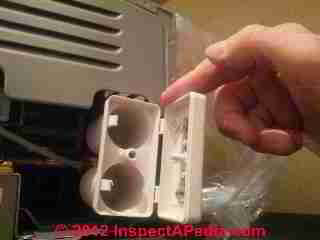
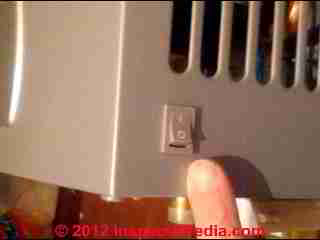
3. Install batteries in the heater's battery compartment (above left, shown empty of batteries), making sure that the batteries are new, of the proper type and rating, and installed with their + and - ends in the proper position.
4. Turn the heater's ON-OFF switch to the ON position (above right) - our photo shows the switch in the ON position.
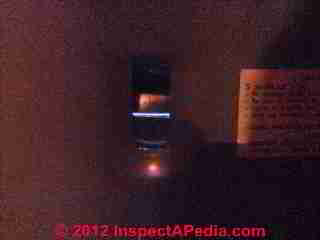
Above our photo shows how you can verify that the gas flame is on in this tankless water heater - but it's not easy to see on this model. We listen for flame and we feel the exhaust (be careful about burns!)
5. Turn on hot water at a nearby fixture - you should see the flame indicator lit in the front of the water heater (blue flame showing in horizontal slit in our photo at left) and you should feel hot water delivered at the fixture.
Minimum Hot Water Flow Rate Required for Tankless Water Heaters
The burners of an instant or tankless water heater are triggered by sensors that detect the flow of water. If the flow of water is too low, typically less than ½ gallon per minute, the burners will not turn on and no hot water will be delivered.
Minimum Hot Water Flow Rates to Avoid Instant Water Heater Shutdown |
|
|---|---|
| Model [using Bosch Confort low pressure series as example] | Minimum water flow rate |
| Bosch 6L | 2.5 LPM - 0.66 GPM |
| Bosch 10L | 4.2 LPM = 1.1 GPM |
| Bosch 13L | 4.2 LPM = 1.1 GPM |
Notes to the table above
The ignition of the instant water heater depends only on the minimum water flow rates shown in the table above. These flows are for and pertain only to a low-pressure water heater installation. [1a]
Watch out: water-saving shower heads, for example, may not allow enough flow to turn the water heater on, especially when the water heater has a high minimum flow rate. Rheem and Bosch (table above), for example, requires a .66 GPM flow rate to ignite the burner on smaller capacity units and a higher flow rate on higher capacity units.
(This is probably to avoid overheating in & damage to the tankless water heater's heat exchanger.)
High Elevation Requires Special Modification for some Tankless Water Heaters
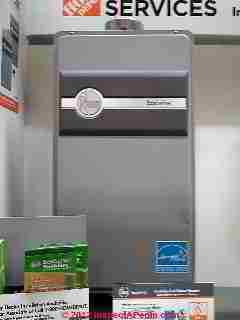 Some tankless water heaters may not operate properly at high elevation installations. Some manufacturers address this specifically.
Some tankless water heaters may not operate properly at high elevation installations. Some manufacturers address this specifically.
For example, all Rheem tankless water heaters can be programmed to operate at elevations up to 9,840 feet. Our photo (left) illustrates a Rheem Eco-Sense instant water heater for sale in a Home Depot store in Phoenix, Arizona (2012).
Tankless Water Heater Pressure / Temperature Relief Valve Safety Requirements
Although there is no large reservoir of hot water, in some jurisdictions a relief valve must be provided on the tankless water heater installation.
The temperature/pressure relief valve lets water escape if the temperature or pressure is too high.
This valve should be connected to a tube that discharges no more than six inches above floor level so hot water won't scald anyone nearby.
Some codes require that the tube discharge outside the building. The tube should be as large as the tank fitting and the tube end should never be threaded, capped or plugged.
The tube should be able to withstand 250°F temperatures, should have no shut-off valve, and should be as short and as straight as possible.
Combustion Air Requirements for Gas-Fired Tankless Water Heaters
In response to complaints of combustion gas odors, CO alarms sounding, and intermittent loss of hot water where tankless water heaters were installed we inspected several rental properties owned by the same landlord [B.P., SMdA, MX]. We found that the plumber she used to install tankless water heaters at multiple apartments didn't realize that each gas fired unit needed combustion air for safe and continuous operation..
Each tankless water heater had been installed on an exterior wall and to avoid tenants fooling with the heater, the plumber enclosed each unit in a steel box with a lock.
The tenants complained of gas odors and of constant loss of hot water. Because the units were installed outdoors the dangerous carbon monoxide that was being produced had not resulted in a catastrophe.
Combustion Air Requirements for Low Pressure Bosch Instant Water Heaters |
|
|---|---|
| Model | Minimum unobstructed opening to assure adequate combustion air |
| Bosch low pressure Series 6 BP | > 60 cm2 |
| Bosch low pressure Series 10 BP | > 90 cm2 |
| Bosch low pressure Series 13 BP | > 120 cm2 |
Notes to the table above
The Bosch low pressure instant water heater series used as an illustration here requires combustion air as shown here. Combustion air requirements for these appliances are the same for both LP gas and natural gas: [Other brands and models will of course have different requirements]
How did the new tankless water heater perform compared to the conventional hot water tank & heater that was removed
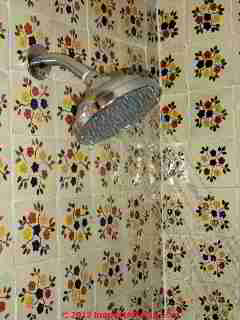 Surprises with the tankless water heater installation
Surprises with the tankless water heater installation
Well the bottom line is the owners are pretty happy with their new instant water heater, with "endless" hot water on demand and no LP gas fuel consumption when no one needs hot water.
Once the occupants learned how to work with the low pressure instant water heater system the result was the ability to run a single shower with plenty of hot water, on demand, without running out. But there were a few surprises and disappointments to get by first.
- Total hot water flow limitations - two showers at once? Despite the packaging claim that the Bosch N13BP LP gas instant water heater was designed to support two simultaneous showers, you are not necessarily going to see that performance at every installation.
In this particular installation, running two showers at the same time at the same building level (the building has baths on three different floor levels) results in delivery of warm but not hot water to both showers. If the occupants want a really hot shower they run just one shower at a time.
The variations are most likely due to peculiarities in individual building water pressure and in the actual routing of existing water piping.
Bosch recommends feeding a dedicated cold water line directly to the water heater and carrying separate cold (from the cold source) and hot (from the heater) to the location where hot water will be used. But when installing a tankless water heater at many buildings you may find that the existing piping was not routed by that schema.
- Trouble balancing hot water temperature. In the installation tested here we found that
turning on too much cold water while hot water is running drops water pressure enough at the instant water heater that the heater simply shuts off entirely.
The manufacturer's specifications indicate that the high capacity (two shower) Model 13BP (rated at 13 liters maximum flow?) requires a minimum flow of 4.2 liters per minute (about 1.1 gpm in U.S. gallons).
Drop below that flow rate and the heater turns off to avoid damage. We had trouble believing that the flow at the water heater was really falling below 1.1 gpm, but nevertheless we found the heater turning off - unpleasant for those in the shower.
We were able to obtain quite successful single-shower operation by turning the hot water fully-on, then carefully opening the cold water tap in the shower, bath, or sink just enough to drop the temperature to a desired level. - No hot water at low-flowing fixtures. At a sink or other plumbing fixture has a rather low water flow rate for any reason (clogged sink strainer, water saving faucet or shower head, etc) we get no hot water at all.
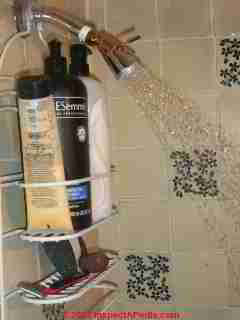
- Just tepid hot water at high-flow rate plumbing fixtures: if you love those shower heads that offer "standing in a summer rain" huge water flow rates you may find that the flow rate is fast enough that the hot water may not be as hot as you want.
You may need to experiment with more than one type of shower head or sink faucet to get the performance you want.
For the water heater installation discussed here we had to change out one high-flow-rate shower head that produced dribbling water flow rather than a good spray.
We figured that to our surprise, the new tankless water heater itself was providing enough restriction in hot water flow rate that the super-high-flow shower head no longer worked.
We changed that shower head out for a more conventional shower head that provided a bit more back-pressure and produced a better spray. The successful shower head that worked just fine is shown in our photo at left. - Hot water temperature, cold surges & temperature balancing problems are probably more common on low-pressure tankless water heater installations.
These problems are going to be more noticeable at low-pressure instant water heater installations than at water supply systems served by sufficient municipal water pressure or by buildings served by a private water system using a pump and pressure tank that assures higher water pressures than the pure gravity-operated rooftop tank systems common in some areas.
Suggestions for dealing with these hot water flow questions & problems are below in this article beginning at How to Get the Most from Your Tankless Instant Water Heater
Tankless Water Heater Hot Water Supply Sudden On-Off & Intermittent hot water losses
At /plumbing/Tankless_Water_Heater_Repair_Guide.phpters2.htm">TANKLESS WATER HEATER REPAIR GUIDE we explain that some tankless water heaters do not heat continuously and constantly. If a particular model has this problem users will find that in the shower the water runs in cold bursts from time to time.
Watch out: In our own tankless water heater installation experience in the U.S. & Mexico we have confirmed that there can be hot water constancy & flow regulation problems, particularly in low-pressure tankless water heater installations.
Depending on exactly how hot and cold water pipes are routed to the tankless water heater and to various plumbing fixtures in a building, low pressure tankless water heater units are sensitive to reductions in water flow rate when additional plumbing fixtures are in operation in the same building.
The result can be
- complete cessation of hot water (the heater turns off on a too-low-flow-rate condition) or
- difficulty balancing the proper hot water temperature by attempts to mix cold water in at the shower or sink where hot water is in use.
We suspect that for this reason, after about 2004, Bosch stopped selling low pressure tankless water heaters in the U.S. However as recently as in 2012 these units continue to be sold and installed in other countries including Mexico where some homes depend on low water pressure delivered from a (not very high) rooftop water storage tank.
How to Get the Most from Your Tankless Instant Water Heater & How to Avoid Sudden Cold Water Bursts or Complete Loss of Hot Water from a Tankless or Instant Water Heater System
- Careful use of cold water mix-in at the plumbing fixtures in use
- Careful choice of bath shower head fixtures to provide sufficient water flow rate to be sure to exceed the low-flow cutoff flow rate at the instant water heater. You may find that you need more actual flow than the claimed low-flow cutoff point stated by the manufacturer, perhaps because of building piping characteristics or from water pressure source variations. Ditto for sink faucets. Most tub faucets run plenty fast and won't give trouble.
- Setting down the hot water temperature at the tankless water heater and reducing the mix-in of cold water at the plumbing fixture
- Installation of a water pressure boosting pump and pressure tank
- Installing a dedicated cold water input line from the water storage tank to the tankless water heater cold-input fitting
- Replacing the low-pressure tankless water heater with a high pressure unit combined with installation of a water pressure boosting pump and tank system - the most expensive solution to these complaints.
LP to Natural Gas Conversion for Tankless, Demand, Instantaneous, or Point of Use Water Heaters?
Watch out: most tankless or demand water heaters (such as those made by Bosch & by Rheem) are sold in models designed for a specific fuel such as Natural gas OR LP Gas.
Some instant water heaters such among the Rheem units cannot be converted from LP to Natural Gas or vice versa. So be sure you are specifying the proper model and fuel type when buying a tankless water heater.
Fuel Alternatives for Tankless Water Heaters: Butane, Natural Gas, Propane: proper set-up required
Several readers have asked about the availability of a butane-fueled tankless water heater, and about converting tankless water heaters among fuels using butane (C4H10), propane, or natural gas. Indeed it is possible to convert most gas-fired heating appliances among fuels. But conversion to the proper pressures, combustion air settings, and fuel jets is necessary unless the appliance has been delivered already set up for the fuel you intend to use.
Bosch and some other tankless or point of use water heaters provide a conversion kit to change a natural gas model water heater to a propane or butane fuel source, or vice versa.
Details about the difference between LPG, Butane, and Propane and Natural Gas are discussed
at GAS BTUH, CUBIC FEET & ENERGY.
Other tankless water heater accessories & kits include
- Accessories to assist in draining & cleaning the heat exchanger
- Accessories to control combustion products & assure adequate exhaust ventilation
Tankless Water Heater Installation Guides & Manuals
- See WATER HEATER AGE & MANUALS - home - complete library of PDF downloads
- See TANKLESS WATER HEATER REPAIR GUIDE - home
- ASSE, RECOMMENDED INSTALLATION PRACTICESFOR RESIDENTIAL TANKLESS WATER HEATERS TO REDUCE THE DANGER OF SCALDING [PDF] ASSE 1079
Performance Requirements for Dielectric Pipe Unions (2012), ASSE International, 18927 Hickory Creek Drive, Suite 220,
Mokena, IL 60448 United States Tel:
(708) 995-3019 Website: https://www.asse-plumbing.org/ retrieved 2020/04/30 original source: https://www.asse-plumbing.org/media/23753/asse_tankless_water_heaters_white_paper.pdf
Excerpt: This white paper focuses on the recommended installation practices that plumbers, installers, and/or plumbing contractors should follow to reduce the dangers of scald injuries or thermal shock when installing any type of residential tankless water heater.
This paper also addresses some of the potential problems with poor, unprofessional installations and the solutions to those problems. The paper also points out the responsibilities of the installer. - BOSCH WATER HEATER AGE & MANUALS - tankless water heaters
- ECCOTEMP ECR H2O INDIRECT WATER HEATER INSTALLATION MANUAL [PDF]
- ECCOTEMP FVI-12 LP/NG WHOLE HOME TANKLESS WATER HEATER MANUAL [PDF]
- ECCOTEMP 45-HI TANKLESS WATER HEATER USE & CARE MANUAL [PDF] indoor & outdoor models
- EVERHOT WATER HEATERS - tankless water heaters
- RHEEM WATER HEATER AGE & MANUALS - includes Rheem tankless water heaters
...
Reader Comments, Questions & Answers About The Article Above
Below you will find questions and answers previously posted on this page at its page bottom reader comment box.
Reader Q&A - also see RECOMMENDED ARTICLES & FAQs
Comment:
(Jan 11, 2017) faisal dad khan said:
my geazar start sudden stop . gas is available, water also runing and my battery is new.
(Apr 11, 2015) Mar said:
My Neighbour has one and it is very loud between the houses. .Not able to leave our windows open on all levels of the home! Sounds like a plane in our yard! No happy about this.
Reply:
The unit may not be operating properly. Or you may be hearing different equipment. Most tankless heaters are very quiet.
...
Continue reading at TANKLESS WATER HEATER INSTALLATION REQUIREMENTS, COSTS or select a topic from the closely-related articles below, or see the complete ARTICLE INDEX.
Or see these
Recommended Articles
- TANKLESS WATER HEATERS
- ELECTRIC SHOWER HEATERS
- RHEEM TANKLESS WATER HEATER LEAK REPAIR
- TANKLESS WATER HEATER CAPACITIES
- TANKLESS WATER HEATER CONVERT TO?
- TANKLESS WATER HEATER INSTALLATION
- TANKLESS WATER HEATER INSTALLATION REQUIREMENTS, COSTS
- TANKLESS WATER HEATER LIFE & USES
- TANKLESS WATER HEATER MULTIPLE GANGED
- TANKLESS WATER HEATER REPAIR GUIDE
- TANKLESS WATER HEATER SIZE REQUIREMENTS
- TANKLESS HOT WATER HEATER TEMPERATURE CONTROL
- TANKLESS WATER HEATER WHISTLE
Suggested citation for this web page
TANKLESS WATER HEATER INSTALLATION at InspectApedia.com - online encyclopedia of building & environmental inspection, testing, diagnosis, repair, & problem prevention advice.
Or see this
INDEX to RELATED ARTICLES: ARTICLE INDEX to WATER HEATERS
Or use the SEARCH BOX found below to Ask a Question or Search InspectApedia
Ask a Question or Search InspectApedia
Try the search box just below, or if you prefer, post a question or comment in the Comments box below and we will respond promptly.
Search the InspectApedia website
Note: appearance of your Comment below may be delayed: if your comment contains an image, photograph, web link, or text that looks to the software as if it might be a web link, your posting will appear after it has been approved by a moderator. Apologies for the delay.
Only one image can be added per comment but you can post as many comments, and therefore images, as you like.
You will not receive a notification when a response to your question has been posted.
Please bookmark this page to make it easy for you to check back for our response.
IF above you see "Comment Form is loading comments..." then COMMENT BOX - countable.ca / bawkbox.com IS NOT WORKING.
In any case you are welcome to send an email directly to us at InspectApedia.com at editor@inspectApedia.com
We'll reply to you directly. Please help us help you by noting, in your email, the URL of the InspectApedia page where you wanted to comment.
Citations & References
In addition to any citations in the article above, a full list is available on request.
- AvantiGas, "Propane and Butane, Know your LPG", Avanti Gas Ltd Avanti House, PO Box 1100, Chesterfield, Derbyshire. S44 5YQ UK United Kingdom Tel: 0808 208 0000 Email: enquiries@avantigas.com Retrieved 3/3/2014, original source: http://www.avantigas.com/propane-butane/
- "Butane", Wikipedia, retrieved 3/3/2014, original cource: http://en.wikipedia.org/wiki/Butane
- "Butane", Princeton University, retrieved 3/3/2014, original source: https://www.princeton.edu/~achaney/tmve/wiki100k/docs/Butane.html
- [1] Bosch Tankless Water Heaters - http://www.boschhotwater.com/
- [1a] Bosch, "Instrucciones de instalacion y manejo, Calentador de agua instantaneo, Confort / Confort S 6BP / 6BP n 10BP / 10BP N 13BP / 13BP N" Robert Bosch, S. de R.L. de C.V., Calle Robert Bosch 405, Zona Industrial, Toluca, Edo de Mexico CP 50070, website: www.bosch.com.mx, Tel: 800-11-26724 (2010)
- [2] Chromolite Tankless Water Heaters
- [3] Bradford White Everhot Tankless Water Heaters - Bradford White offers this step by step hot water retrofit installation file (large, slow PDF) - www.bradfordwhite.com
- [4] Eemax Tankless Water Heaters - http://www.eemaxinc.com/
- [5] Noritz Tankless Water Heaters - http://www.noritz.com/
- [6] Rheem Tankless Water Heaters - http://www.rheemtankless.com/content/
- [7] Rinnai Tankless Water Heaters - http://www.rinnai.us/tankless-water-heaters/
- Stiebel Eltron Tankless Water Heaters - http://www.stiebel-eltron-usa.com/
- [8] Takagi USA Tankless Water Heaters - http://www.takagi.com/
- [9] Titan Tankless Water Heaters - http://www.titanheater.com/
- [10] U.S. Department of Energy on Tankless Water Heaters - http://apps1.eere.energy.gov/consumer/your_home/water_heating/index.cfm/mytopic=12820
- [11] "Tankless or Demand Type Water Heaters,"U.S. Department of Energy, retrieved 10/14/2012, original source: http://energy.gov/energysaver/articles/tankless-or-demand-type-water-heaters [Copy on file as Tankless_Water Heaters_DOE.pdf]
- Consumer Reports offers an article on the efficiency versus the economy of tankless water heaters - see http://www.consumerreports.org/cro/Appliances/heating-cooling-and-air/water-heaters/tankless-water-heaters/overview/tankless-water-heaters-ov.htm
- In addition to citations & references found in this article, see the research citations given at the end of the related articles found at our suggested
CONTINUE READING or RECOMMENDED ARTICLES.
- Carson, Dunlop & Associates Ltd., 120 Carlton Street Suite 407, Toronto ON M5A 4K2. Tel: (416) 964-9415 1-800-268-7070 Email: info@carsondunlop.com. Alan Carson is a past president of ASHI, the American Society of Home Inspectors.
Thanks to Alan Carson and Bob Dunlop, for permission for InspectAPedia to use text excerpts from The HOME REFERENCE BOOK - the Encyclopedia of Homes and to use illustrations from The ILLUSTRATED HOME .
Carson Dunlop Associates provides extensive home inspection education and report writing material. In gratitude we provide links to tsome Carson Dunlop Associates products and services.


